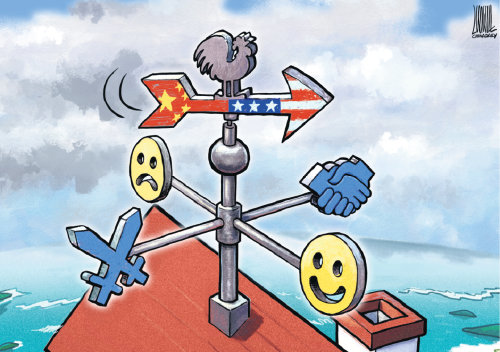Peking University, February 23, 2021: If we look at China-US relations from a historical perspective, there are many factors that define them, such as commerce and differing values.

World War II gave rise to the US hegemony. The motivation to maintain this status plays a very important role in its China policy. However, it is also important for China and the United States to stand together under a common international framework, as many of the factors benefiting China-US ties exist only under multilateral mechanisms that came into place as relations between the two countries developed over the past 40 years. Continuing bilateral ties under international institutions will thus contribute to the stability of China-US relations.
Hostility is another factor affecting China-US relations. It is a tradition for the US to seek and make external enemies to build domestic consensus and political unity. Given its different political system, China serves as a convenient enemy for the US.
US policy toward China under the new Joe Biden administration and the future of China-US relations are likely to witness the following new characteristics.
First, Biden's China policy and China-US ties may go in two ways. One is Trumpism without Trump. Some hardliners among the Democrats will seek every opportunity to get tough on China, while the squeeze from Republicans will keep Biden in check in Congress. The other possibility is a China-US relationship that features both competition and cooperation. Biden has made it clear that he considers China as a major competitor, not an enemy. This means that China and the US can cooperate where they are supposed to, in areas such as climate change and the fight against the novel coronavirus. However, it is uncertain how deep the competition will be and how much the two countries can cooperate.
Second, Biden's China policy will ensure that the US continues to compete with China despite a highly interdependent relationship. He has stressed that a complete decoupling with China is unrealistic, because of vested interests and the benefits of globalization. It is in the interest of both China and the US to maintain close economic ties, but this does not preclude the possibility of a partial technological decoupling. Biden will probably take the advice of US companies on how to carry out the technological competition. He will also consider further opening up markets, which may lead to increased competition between the US and China under the multilateral framework.
In this new environment, China will be both more assertive and further open up, as evidenced by China's efforts to push for the signing of the Regional Comprehensive Economic Partnership Agreement and to join the Comprehensive and Progressive Agreement for Trans-Pacific Partnership (CPTPP). In contrast, the Biden administration will be constrained by US domestic politics in any negotiations on the US joining the CPTPP. Against this backdrop, China's proactive measures to further open up showcases its stronger governance capabilities to deal with both domestic and international issues.
Third, China and the US will see intensified competition in terms of ideology and values, presenting a great challenge to China. The concept of "reciprocity "that the US people used on many occasions will overshadow China-US ties that is marked by both competition and interdependence. The US call for "reciprocity "will not be limited to trade and investment, but will extend to areas such as the press and publishing, media management, education, and people-to-people exchanges.
Fourth, high-level engagement and dialogue is the key to shaping the future of China-US ties. The dialogue should identify strategic common interests between China and the US, as the bottom line has to be no war. There are common interests and responsibilities between China and the US, and there is also competition between them. As economic globalization deepens, political trust must be the foundation for relations. Political trust existed between China and the US over the past three decades. When China chose to embrace globalization, the US welcomed it. But the situation was changed in recent years. The lack of political mutual trust between China and the US means their relations are moving in a dangerous direction with two parallel markets and two sets of supply chains emerging. Therefore, China and the US need to strengthen their political mutual trust.
Overall, the four years of Donald Trump in the White House and the ongoing pandemic have significantly changed the relationship between the US and the world, and between China and the world. There are dramatic changes in the national strengths of China and the US as well, with China's national strengths clearly on the rise. China has demonstrated its resilience, its capability to mobilize resources, and its enhanced State governance when dealing with trade conflicts and the competition with the US. China will be more confident when facing pressure from the US. In the new context, China will embrace the regional and international environment with greater confidence and openness, including shaping the future of China-US relations.
The author is Wang Yong, professor with the School of International Relations, director of the Center for American Studies and director of the Center for International Political and Economic Studies at Peking University.
Photo credit to: Luo Jie
Source: China Daily